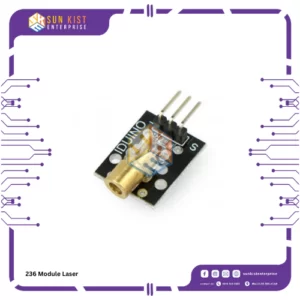Description
The ESP32 Module with 38 pins is a compact and versatile microcontroller module based on the ESP32 chipset, renowned for its powerful processing capabilities and integrated Wi-Fi and Bluetooth connectivity. Here’s a detailed description:
The ESP32 Module with 38 pins is a highly integrated microcontroller module designed for a wide range of IoT (Internet of Things) and embedded applications. It features the ESP32 chip, developed by Espressif Systems, which combines a dual-core Xtensa LX6 microprocessor with integrated Wi-Fi and Bluetooth connectivity, as well as a rich set of peripheral interfaces.
Key features of the ESP32 Module with 38 pins include:
1. **ESP32 Chipset**: The module is built around the ESP32 chip, which features a dual-core 32-bit CPU running at up to 240 MHz. The powerful processor, based on the Xtensa LX6 architecture, provides ample processing power for a variety of tasks, including real-time data processing, communications, and sensor interfacing.
2. **Integrated Wi-Fi and Bluetooth**: The ESP32 chip integrates both Wi-Fi (802.11 b/g/n) and Bluetooth (Bluetooth v4.2 BR/EDR and BLE) connectivity, allowing for seamless wireless communication with other devices and networks. This enables IoT applications to connect to the internet, exchange data, and interact with cloud services.
3. **38-pin Module**: The module features 38 pins, including GPIO (General Purpose Input/Output) pins, UART (Universal Asynchronous Receiver-Transmitter) ports, SPI (Serial Peripheral Interface) ports, I2C (Inter-Integrated Circuit) interfaces, analog inputs, and various other digital and analog I/O pins. These pins provide versatile connectivity options for interfacing with sensors, actuators, displays, and other peripheral devices.
4. **Compact Form Factor**: The module is designed to be compact and space-efficient, making it suitable for integration into a wide range of electronic devices and projects. Its small size and lightweight construction enable easy integration into IoT prototypes, wearable devices, sensor nodes, and other embedded systems.
5. **Open-Source Development**: The ESP32 module is supported by an active open-source community, providing extensive documentation, tutorials, and software libraries to facilitate development. Developers can leverage the ESP-IDF (Espressif IoT Development Framework) or platform-specific SDKs to build custom firmware and applications tailored to their specific requirements.
6. **Low Power Consumption**: The ESP32 chip is optimized for low-power operation, featuring various power-saving modes and advanced sleep states. This makes it ideal for battery-powered and energy-efficient IoT devices, extending battery life and reducing overall power consumption.
Overall, the ESP32 Module with 38 pins offers a powerful and flexible platform for developing a wide range of IoT and embedded applications. Its integrated Wi-Fi and Bluetooth connectivity, versatile peripheral interfaces, and compact form factor make it a popular choice among developers for prototyping, experimentation, and production deployment.










